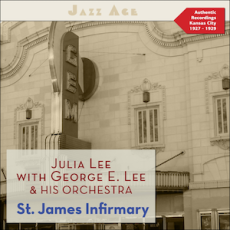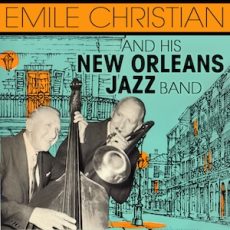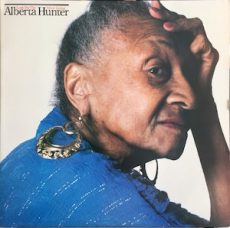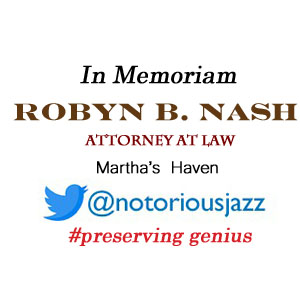
Daily Dose Of Jazz…
George Ewing Lee was born April 28, 1896 in Boonville, Missouri, and was the older brother of pianist and singer Julia Lee. They performed with their father’s string trio at neighborhood house parties and church socials. He played in a band while serving in the Army in 1917, and following this period, he sang in a vocal quartet.
In 1920 he formed and led George E. Lee Novelty Singing Orchestra and with his sister as one of the group’s members, he was a regular performer at Lyric Hall in Kansas City, Missouri through much of the 1920s.
Though he played many instruments, singing was his forte and he had a powerful voice and a penchant for ballads and novelty songs. Through the 1920s no group in Kansas City could compete vocally with the Lee Orchestra.
In 1927 they recorded as an octet with Jesse Stone on piano, for Meritt Records. Among the tunes was Down Home Syncopated Blues, and was the earliest recording of Julia Lee’s voice. They recorded six tunes for Brunswick in 1929.
In 1933, his group was absorbed into the Bennie Moten Orchestra. By 1935 he continued to perform with smaller ensembles through the decade. In 1937, at a resort in the Ozarks, Lee fronted a small group that included 17 year-old saxophonist Charlie Parker. Two years later he struck out on his own again, moved to Jackson, Michigan in 1940 and retired from music in 1941. He began
By the 1940s, he moved to San Diego, California. Vocalist and bandleader George E. Lee, who was sometimes billed as the Cab Calloway of the Middle West, died on October 2, 1958.
More Posts: bandleader,history,instrumental,jazz,music,vocal

Daily Dose Of Jazz…
Emile Joseph Christian born April 20, 1895 in the Bywater neighborhood of New Orleans, Louisiana, was the younger brother of noted cornetist and bandleader Frank Christian. He played both cornet and trombone with the Papa Jack Laine bands. He went to Chicago, Illinois in late 1917 to play trombone with the Bert Kelly Jass Band. The following year he moved to New York City, replacing Eddie Edwards in the Original Dixieland Jass Band, touring England and making his first recordings with this band.
After a brief time in the Original Memphis Five, he returned to Europe and from 1924 into the 1930s, he played bass and trombone with various jazz bands. In Berlin, Germany he recorded, in Stockholm, Sweden he recorded with Leon Abbey’s band. In Paris, Nice and Aix-les-Bain, France he played with Tom Waltham’s Ad-Libs. In 1935 he played with Benny Peyton’s Jazz Kings in Switzerland.
Christian played in both Black and White bands in Europe and India before returning to the United States after the outbreak of World War II. The 1950s saw him moving back to New Orleans, where he played with the bands of Leon Prima, Santo Pecora, and Sharkey Bonano and his own band. In 1957 he toured with the Louis Prima Band and continued playing in New Orleans into 1969.
Trombonist and cornetist Emile Christian, who wrote a number of tunes and in his later years mostly playing string bass, died on December 3, 1973 in New Orleans at the age of 78.
More Posts: cornet,history,instrumental,jazz,music,string bass,trombone

Daily Dose Of Jazz…
Alberta Hunter was born on April 1, 1895 in Memphis, Tennessee to Laura Peterson, who worked as a maid in a Memphis brothel, and Charles Hunter, a Pullman porter, a father she never knew. She attended Grant Elementary School and attended school until around age 15.
Hunter had a difficult childhood and left for Chicago, Illinois, around the age of 11 in the hopes of becoming a paid singer hearing that it paid ten dollars per week. Instead of finding a job as a singer she worked at a boarding house for six dollars a week with room and board.
Her singing career started in a bordello and soon moved to Saloons, bars and clubs that appealed to men, black and white alike. By 1914 Alberta was receiving lessons from jazz pianist, Tony Jackson, who helped her to expand her repertoire and compose her own songs. Her big break came when she was booked at Dreamland Cafe, singing with King Oliver and his band.
Sheeventually rose from the city’s lowest dives to headlining the most prestigious venue for black entertainers, the Dreamland ballroom. She had a five-year residency with the venue in 1917 for $35 a week. She first toured Europe in 1917, performing in Paris and London. The Europeans treated her as an artist, showing her respect and even reverence, which made a great impression on her.
Hunter flourished in the 1920s and 1930s on both sides of the Atlantic. She recorded prolifically during the 1920s, starting with sessions for Black Swan in 1921, Paramount in 1922–1924, Gennett in 1924, OKeh in 1925–1926, Victor in 1927 and Columbia in 1929. While still working for Paramount, she also recorded for Harmograph Records. By the early 1940s she was performing at home and eventually moved to New York City where she performed with Bricktop and recorded with Louis Armstrong and Sidney Bechet.
Continuing to perform on both sides of the Atlantic she was the head of the U.S.O.’s first black show. In 1944, she took a U.S.O. troupe to Casablanca, in both theatres of World War II, then to Korea until her mother’s death in 1957. She retired from music and went into healthcare, becoming a nurse for 20 years at Roosevelt Island’s Goldwater Memorial Hospital. Aged out of the hospital because they believed she was 70, at 82 she returned to singing. With a two week residency at a Greenwich Village club, that turned into a six year attraction until her death on October 17, 1984 in Roosevelt Island, New York at the age of 89.

Daily Dose Of Jazz…
Zue (C. Alvin) Robertson was born on March 7, 1891 in New Orleans, Louisiana. His first instrument was the piano, and switched to playing the trombone at the age of 13. He performed in circus bands and traveling revues, including Kit Carson’s Wild West Show. He was part of the Olympia Band around 1914 and was a trombonist for Manuel Perez, Richard M. Jones, and John Robichaux.
Robertson was an early influence on Kid Ory, giving him lessons, and the two practised together. After moving to Chicago, Illinois in 1917 he played at the De Luxe Café, and by the mid-1920s he was playing with leaders of the stature of Jelly Roll Morton, with whom he recorded Some Day Sweetheart/London Blues in 1923, and King Oliver in 1924.
He recorded two sides with the Levee Serenaders in 1928 and plus the two from 1923, are his only recordings. After moving to New York City in 1929, Robertson concentrated on playing the organ and the piano, and stopped playing the trombone the following year. A few years later he moved to California, where he played piano and added the bass during the years he spent in the 1930s.
Trombonist Zue Robertson, who also played piano, organ, and bass, died in 1943 in Los Angeles, California.
More Posts: bass,history,instrumental,jazz,music,organ,piano,trombone

Daily Dose Of Jazz…
Wellman Braud was born on January 25, 1891 in St. James Parish, Louisiana and settled in New Orleans, Louisiana. In his early teens he was playing the violin and the upright bass and leading a trio in venues in the Storyville District before 1910.
Moving to Chicago, Illinois in 1917 by 1923 he was performing in London, England with the Plantation Orchestra, doubling on bass and trombone. His next move was to New York City, where he played with Wilber Sweatman’s band before joining Duke Ellington.
Braud was the first to utilize the walking bass style that has been a mainstay in modern jazz. His vigorous melodic bass playing, alternately plucking, slapping, and bowing, was an important feature of the early Ellington Orchestra in the 1920s and 1930s. In 1936 he co-managed a short-lived Harlem club with Jimmie Noone, and recorded with the group Spirits of Rhythm from 1935 to 1937.
He would go on to play with the bands of Kaiser Marshall, Hot Lips Page, and Sidney Bechet and returned for a while to Ellington in 1944. In 1956 Wellman joined the Kid Ory Band and in the late 1950s, he joined the Barbara Dane Trio. Doing so he turned down opportunities to return to Duke Ellington’s band and tour with Louis Armstrong.
Upright bassist Wellman Braud, who is a distant relative of the Marsalis brothers on their mother’s side, died on October 29, 1966 in Los Angeles, California, at the age of 76.
Duke Ellington postumously paid tribute to Braud, with the composition Portrait of Wellman Braud on his 1970 album New Orleans Suite.
More Posts: bass,history,instrumental,jazz,music




